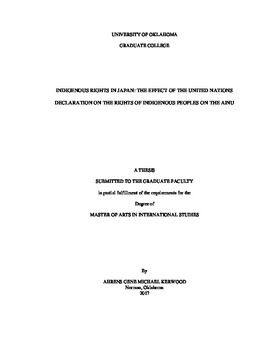| dc.contributor.advisor | Heinze, Eric | |
| dc.contributor.author | Kerwood, Ahrens | |
| dc.date.accessioned | 2017-05-12T16:35:09Z | |
| dc.date.available | 2017-05-12T16:35:09Z | |
| dc.date.issued | 2017-05 | |
| dc.identifier.uri | https://hdl.handle.net/11244/50837 | |
| dc.description.abstract | This thesis examines how Japan internalizes international Indigenous rights norms. The application of the Declaration on the Rights of Indigenous Peoples (DRIP) in Japan relating to Ainu Indigenous rights provides a narrow case study for my analysis. On July 6, 2008, the Japanese government recognized the Ainu as Indigenous. Utilizing the five-phase spiral model, I find that the DRIP acted as an impetus for change within the context of Indigenous rights in Japan. In the first section of this thesis, I describe the current international development of Indigenous rights norms. In doing so, I introduce the spiral model as a constructivist analysis of norm internalization. The spiral model provides a nexus between two popular Indigenous law perspectives—social movements and the legalist rational model, which provide pressures for governmental reform from below and above, respectively. This thesis ultimately demonstrates how these pressures cooperated to progress Japan further through the spiral model. The rest of this thesis examines the Japan-Ainu case study within the framework of the spiral model. I begin my spiral model analysis with Phase 1 (repression and activation of networks) at the end of World War II. From there, I systematically pinpoint Japan’s progression through Phase 2 (denial) and Phase 3 (tactical concessions). Near the end of Phase 3, I demonstrate how the DRIP assisted Japan’s transition into Phase 4 (prescriptive status), where it remains currently. I also discuss what changes are necessary to shift Japan into Phase 5 (rule-consistent behavior). In conclusion, I determine that cooperative domestic-transnational pressures can use non-binding international documents such as the DRIP to bring about moderate change in a state’s Indigenous policies. | en_US |
| dc.language | en_US | en_US |
| dc.subject | Indigenous Rights | en_US |
| dc.subject | Ainu | en_US |
| dc.subject | Japan | en_US |
| dc.subject | Declaration on the Rights of Indigenous Peoples | en_US |
| dc.title | Indigenous Rights in Japan: The Effects of the United Nations Declaration on the Rights of Indigenous Peoples on the Ainu | en_US |
| dc.contributor.committeeMember | Faison, Elyssa | |
| dc.contributor.committeeMember | Theriault, Noah | |
| dc.date.manuscript | 2017-05-10 | |
| dc.thesis.degree | Master of Arts in International Studies | en_US |
| ou.group | College of International Studies | en_US |
